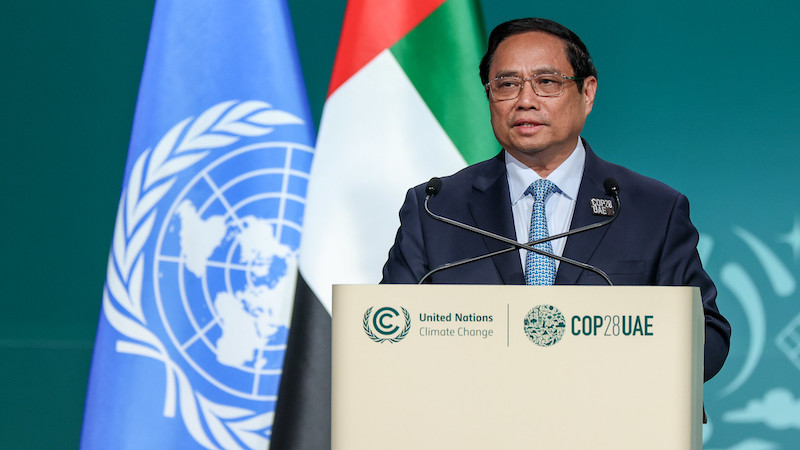When Vietnam and a group of rich countries struck up a $15.5 billion energy transition deal nearly a year ago, they set out an enticing prospect: cheap financing would help the nation leave coal behind.
But, as vague ambitions now turn into concrete plans, the reality looks rather different.
A timeline for the early closure of coal power plants is absent from the investment blueprint for the Just Energy Transition Partnership (Jetp) unveiled at a Cop28 side event on Friday. The government expects instead to operate plants “flexibly” and to rely on the controversial co-firing of biomass and ammonia with coal.
Rich countries have also largely backtracked on their initial promise to offer financial support on more attractive terms than Vietnam could already secure from investors. Nearly 60% of the money will be provided as commercial loans, while the tiny share of grants available is primarily earmarked for technical support, the 223-page document shows.
Leo Roberts, a coal transition expert at E3G, said there are “major reasons” to be concerned.
“The investment plan is no longer the pathway to replacing coal power with clean alternatives the Jetp originally promised. Instead, it focuses on expensive or unproven technologies,” he added. “Those directly undermine the pace and scale of the energy transition.”
Hydropower push
Nearly a year after the initial announcement, Vietnam’s prime minister Pham Minh Chinh has mapped out how Vietnam aims to spend the $15.5 billion pledged by G7 nations to boost the deployment of renewables and cut dependence on coal.
Under the agreement, Vietnam aims to peak its emissions by 2030 – five years earlier than planned – and source close to half of its power from renewable energy within the same timeframe.
The development of dozens of hydropower projects across the country forms the backbone of the government’s strategy to hit the targets. A significant proportion of the donors’ money is already directly allocated to those projects. While the plants are a source of low-emission energy, the construction of dams and reservoirs has caused social and environmental issues in the country, including displacement and water scarcity.
The Vietnamese government also plans to expand its power grid, bolster battery storage, and invest in offshore wind and solar.
Contested coal conversion
New coal plants will continue to be built until 2030, while the government drafts a more detailed plan to deal with existing ones.
A phase-out of coal power plants at a large scale “is not feasible in the near-term” – the investment plan states – “but some older plants may be able to transition to alternative energy sources and uses”. In particular, those that have operating for at least 20 years will begin a phased conversion to biomass and ammonia “provided the price is right”.
NGOs have criticised the use of biomass co-firing, on the basis it prolongs the life of coal plants, emits more CO2 than is commonly accounted for and harms forest ecosystems. Ammonia co-firing is “very costly and has limited feasibility for deployment at scale”, according to E3G.
Loans not grants
A major issue is rich countries are reluctant to commit public money as grants. None have directly allocated finance to retire coal plants early. The plan refers to a need for social security and retraining of workers affected by the transition, but it is unclear who will pay for this.
Contributors prefer to invest in renewable energy projects, which bring a return through electricity sales.
Over half of the $8 billion in public finance will be “commercial” loans disbursed by development banks. Cheaper loans on concessional terms represent roughly a third of the package. Grants make up less than 4% of the money offered by governments, with guarantees and equity contributing to the total.
Commercial banks, part of the GFANZ coalition, are expected to invest the remaining $7.5 billion of the package.
At the launch event, the Vietnamese prime minister was flanked by the EU Commission president Ursula von der Leyen and the UK net zero minister Claire Coutinho.
Von der Leyen called the partnership “a success story”. It is “a good example of everything we want to achieve here at Cop28,” she said. “We want to bring emissions down while driving economic growth up.”
She was echoed by Coutinho, who told Minh Chinh “we are uniting all our efforts behind you”. The Jetp model is “powerful”, she added, “because it is just”.
Silence over environmentalists’ crackdown
Neither of them raised concerns about human rights. The Vietnamese government has brutally cracked down on the civil society representatives that would normally have been key stakeholders in the programme.
Five environmentalists have been jailed in the last two years on tax evasion charges, which human rights groups say are trumped-up accusations. In the most recent case, Hoang Thi Minh Hong, director of the campaign group CHANGE, was handed a three-year prison sentence and a 100 million Vietnamese dong ($4,100) fine last September.

Vietnamese campaigner Hoang Thi Minh Hong was sentenced to three years in prison last September. Photo: CHANGE/350Vietnam
Two weeks earlier Ngo Thi To Nhien, director of an independent energy policy think-tank, had been arrested on a charge of “appropriating documents of agencies and organizations”. Nhien worked for the EU, the UN, and the World Bank and, before her detention, had reportedly provided technical advice for the development of the Jetp.
At the time, the EU, Germany, the US, and UK said they were deeply concerned about the imprisonment of environmentalists.
Campaigners decried the silence over the crackdown at the investment plan launch.
“We urge multilateral development banks and donor governments not to bulldoze ahead with the Jetp,” said Tanya Lee Roberts Davis, NGO Forum on ADB’s Just Transitions Advocacy Coordinator. “Doing so would mean acting as complicit bystanders in the silencing and reprisals faced by community rights, workers’, environmental, and climate advocates.”
